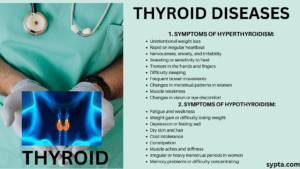WHAT IS THYROID? WHAT ARE THE DISEASE CONDITIONS AND HOW TO SOLVE IT
- The thyroid is located in the neck below Adam’s apple.
- It is a butterfly-shaped gland
- It regulates the body’s metabolism, which converts food into energy.
- The hormones produces by the thyroid gland, control the rate of consumption of energy by our body, also influence the growth and development of the body,
- It maintains body temperature.
- Thyroid hormones have a vital role in the proper functioning of organs, including the heart, brain, liver, and kidneys.
Thyroid disease is detected when the level of hormones that the thyroid gland produces is too much or too little.
There are several types of thyroid diseases, as follows: –
Hypothyroidism: When the thyroid gland doesn’t produce enough thyroid hormones.
Hyperthyroidism: Here thyroid gland produces too many thyroid hormones.
GOITER: Enlargement of the thyroid gland is known as GOITER. It is due to iodine deficiency or other thyroid disorders.
Thyroid nodules: Some lumps or growths form within the thyroid gland. Mostly they are benign, but some may be cancerous.
Thyroid cancer happens in the thyroid gland, But It is very rare.
Treatment for thyroid disease
As per the below type and severity of the condition.
Hypothyroidism: treated with synthetic thyroid hormone replacement therapy.
Hyperthyroidism: treated with medications, radioactive iodine therapy, or surgery.
Goiter: treated with iodine supplementation or surgery, depending on the cause.
Thyroid nodules can monitor or removed if they are causing problems.
Thyroid cancer is treated with surgery, radiation, or chemotherapy.
If you have a thyroid problem It’s better to talk to a healthcare practitioner
THYROID SYMPTOMS
The symptoms of thyroid issues are due to the thyroid gland being overactive (hyperthyroidism) or underactive (hypothyroidism).
Here are some common symptoms:
Symptoms of hyperthyroidism:
- Unintentional weight loss
- Rapid or irregular heartbeat
- Nervousness, anxiety, and irritability
- Sweating or sensitivity to heat
- Tremors in the hands and fingers
- Difficulty sleeping
- Frequent bowel movements
- Changes in menstrual patterns in women
- Muscle weakness
- Changes in vision or eye discomfort
Symptoms of hypothyroidism:
- Fatigue and weakness
- Weight gain or difficulty losing weight
- Depression or feeling sad
- Dry skin and hair
- Cold intolerance
- Constipation
- Muscle aches and stiffness
- Irregular or heavy menstrual periods in women
- Concentration difficulty or Memory problems
Individuals with thyroid problems may have these symptoms, and some may not have any symptoms.
THYROID-STIMULATING HORMONE
The pituitary Glands produce TSH (Thyroid-stimulating hormone). produced It is a small gland located at the base of the brain.
TSH plays a crucial role in regulating the function of the thyroid gland.
When thyroid hormones are low in the bloodstream, the pituitary gland releases TSH, which stimulates the thyroid gland to produce more thyroid hormone.
As the levels of thyroid hormone increase, the pituitary gland reduces the production of TSH, thus regulating the thyroid gland’s activity.
To Understand thyroid disorders, such as hypothyroidism and hyperthyroidism, a blood test to measure TSH levels help in the diagnosis
Hypothyroidism,
When the thyroid gland is underactive, TSH levels increase as the pituitary gland stimulates the thyroid gland to produce more hormones.
Hyperthyroidism,
When the thyroid gland is overactive, TSH levels are usually low, as the pituitary gland is reducing its production of TSH in response to the high levels of thyroid hormone in the bloodstream.
Thyroid normal range
The normal range for thyroid-stimulating hormone (TSH) varies based on the laboratory performing the test and the method used for testing.
The standard reference range for TSH in adults is a range of 0.4 and 4.0 milli-international units per liter (mIU/L).
However, some laboratories may use a narrower range of 0.5 to 2.5 mIU/L.
Several factors can affect TSH levels, including age, gender, and pregnancy. Additionally, individuals with thyroid disease may have TSH levels that fall outside the normal range, and healthcare providers may adjust the reference range depending on the individual’s clinical situation.
Thyroid Symptoms in Hindi
थायरॉइड के संकेत अधिकतर मामलों में उन लोगों में देखे जा सकते हैं जो थायरॉइड अधिक या कम कार्यक्षमता की समस्या से पीड़ित होते हैं। यहां कुछ सामान्य लक्षण बताए गए हैं:
1 थायरॉइड अधिक कार्यक्षमता (हाइपरथायरॉइडिज़्म) के लक्षण:
अनहेल्दी वजन कमी
तेज या अनियमित दिल की धड़कन
घबराहट, चिंता और चिड़चिड़ापन
गर्मी का अनुभव या पसीने की अधिकता
हाथ और उंगलियों में कंपन
नींद में कठिनाई
अक्सर बार-बार मल त्याग करना
महिलाओं में मासिक धर्म की विभिन्नताएं
मांसपेशियों की कमजोरी
दृष्टि में परिवर्तन या आंखों में असुविधा
2 थायरॉइड कम कार्यक्षमता (हाइपोथायरॉइडिज़्म) के लक्षण:
थकान और कमजोरी
वजन बढ़ना या वजन कम करने में कठिनाई
उदासी या दुखी होना
सूखी त्वचा और बाल
ठंडाई की असहजता
कब्ज
मांसपेशियों में दर्द और अकड़न
महिलाओं में अनियमित या भारी
www.sabgardpharmaceuticals.com
Permalink: https://sypta.com/2023/05/01/thyroid/
For Thyroid Treatments products please click below link
#thyroid, #thyroidsymptoms, #thyroidsymptomsinhindi, #thyroidtestprice, #thyroidnormalrange, #thyroidstimulatinghormone, #thyroidgland, #thyroidtest, #thyroidnormalrangeinmale&female, #thyroidkelakshan, #thyroidnodules, #thyroidnodules,#thyroidgland, #thyroidcancer, #whatisthyroid
Kindly leave your comments or email us at sy*****@gm***.com

